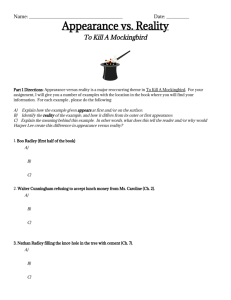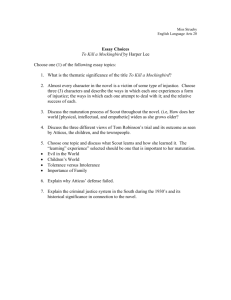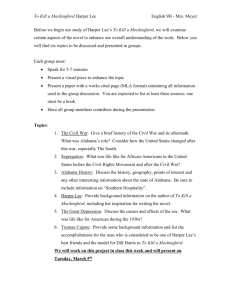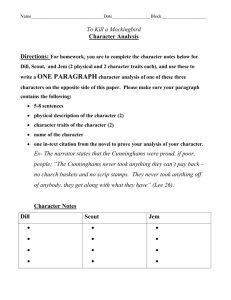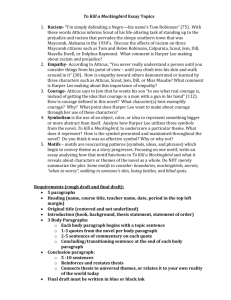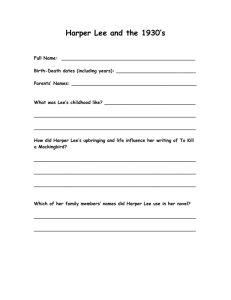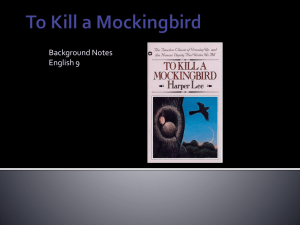To Kill a Mockingbird
advertisement
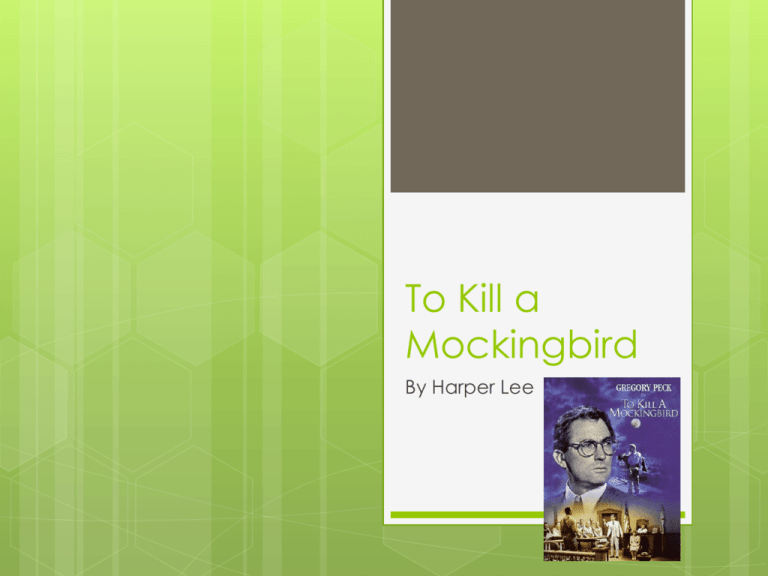
To Kill a Mockingbird By Harper Lee About the Author • Nelle Harper Lee decided she wanted to be a writer when she was seven years old, growing up in Monroeville, Alabama. • Her childhood was very much like Scout’s in To Kill a Mockingbird, and she knew of many cases in which black men were unjustly convicted and imprisoned or executed for raping white women. • Her father was a lawyer, and for a time she was sidetracked into the study of law at the University of Alabama. • She also attended Oxford University in England as an exchange student for one year, but she found she did not want to be a lawyer after all. • She wanted to write. • She quit her law studies and her job as an airline reservations clerk and moved into a tiny cold-water apartment in New York City, which she furnished with castoffs and orange crates. There she began her writing career. University of Alabama Oxford University in England Amasa Lee Truman Capote • When she took her first stories to an agent, the agent like one of them and encouraged her to expand it into a novel. At about this time, Lee’s father, Amasa Lee became ill, and she began traveling frequently to Alabama. • During these visits to Monroeville, Lee was once again confronted with the scenes and people of her childhood, one of them had been her childhood friend, Truman Capote, who would become the model for the character of Dill in her book. • She found a fertile field in which to sow her literary seeds in the lush environment of Alabama, and she began working on To Kill a Mockingbird. • She finished her first draft of the novel in 1957, but the first editor to read it turned it down, so she spent another two and one-half years rewriting and revising what she had begun. • It was difficult and discouraging at times, writing the book over and over again, but she did not give up until she finally go it the way she wanted it. • When it was published in 1960, her hard work was rewarded. Critics loved the book, and readers of all ages agreed. • The film, starring Gregory Peck as Atticus Finch, is one of the few movie gems in which the essence of a novel is captured on film. • In 1961, Lee was awarded the Pulitzer Prize for Fiction. • Harper Lee was suddenly famous. Stories about her appeared in all the leading magazines and newspapers. • Lee, basically a private person who did not relish being the object of attention, soon acquired a reputation of being a recluse, which she was not. • When interviewers asked her whether she was writing another novel, she said she was, but that novel has never been published. • Harper Lee has, over the years, become almost a mythical literary figure, even though she has never published another book. She is not a hermit. • According to friends and relatives, she is a jolly and genial person, but still enjoys her privacy and spends equal amounts of time between New York City and her hometown of Monroeville. • According to a story by Kathy Kemp in The News Observer (November 12, 1997), Lee’s cousin says she once told him when he asked why she had never written another book, “When you have a hit like that, you can’t go anywhere but down.” http://www.biography.com/people/harper-lee-9377021 Book Summary • Jean Louise Finch, called Scout by her family, is six, and her brother Jem is ten when To Kill a Mockingbird begins. • Set in the small town of Maycomb, Alabama, during the Great Depression days of the 1930s, the novel opens during the summer. Dill Boo Radley • When Scout begins to tell her story, she and Jem meet a new playmate, Dill, who has come to spend the summer with his aunt. • Dill is a curious and mischievous child, fascinated by the tales he hears of “Boo” Radley, the neighborhood recluse who unwittingly generates much conjecture about who he is and what he is like because no one has seen him in years. • The children spend their summer devising games intended to get Boo to come out, but they have no success. When school begins, Scout is disappointed. She learns her teacher is horrified that Scout can already read. Scout longs for summer to return so that she, Jem, and Dill can try again to see Boo Radley. The children begin finding small gifts—an old watch, some chewing gum, and other small things--- left in the knothole of a tree on the corner of the Radley property. When Dill returns the following summer, the children once again scheme to bring out Boo, but slowly they begin to realize Boo is not the monster they had imagined. They also discover that the gifts were left for them by Boo himself. • Meanwhile, the Finch children fear that their lawyer father, Atticus, is a coward because he does not like guns as do the other men in the county. Then they see him shoot a mad dog with one shot. • They are confused when children begin calling Atticus “nigger lover” because he is defending a poor black man, Tom Robinson, accused of raping a poor, ignorant, white woman named Mayella Ewell. • Atticus know Tom is innocent, and despite the namecalling and intimidation from whites who think he should not try to get Tom acquitted of the crime, Atticus gives Tom his best defense as the children watch the trial from the “colored” balcony. • Atticus’s efforts on Tom’s behalf are to no avail due the place and time period of the trial, and Tom attempts to escape prison. In doing so, he is shot to death. • Scout, Jem, and Dill learn difficult lessons about the nature of injustice. In their time and pace, the word of a dispicable white man is taken against that of a hard-working, honest, and goodhearted black man, and even the best efforts of a gifted lawyer are not enough to save him. The Ewell’s However, the story does not end there. Scout, herself, is then placed in danger by the victorious and vicious white man who wants revenge on Atticus for showing him to be the truly evil person he is. On the heroism of the least likely person in Maycomb saves Scout from being killed, and Scout learns the real meaning of courage, understanding and tolerance. In To Kill a Mockingbird, Harper Lee has created unforgettable characters and illustrated a time and place which will always be associated with this book. It has never been out of print since its first printing, and in 1995 it was re-released in a new, hardback, thirty-fifth anniversary issue. This truly is a book the reader can turn to again and again, gaining new insights and knowledge each time. It is one of a kind, and the reader is richer indeed for having read it. Citation Robbins, Mari Lu. "About the Author." A Guide for Using To Kill a Mockingbird in the Classroom, Based on the Novel Written by Harper Lee. Westminster, CA: Teacher Created Materials, 1999. 6. Print. Robbins, Mari Lu. "To Kill a Mockingbird." A Guide for Using To Kill a Mockingbird in the Classroom, Based on the Novel Written by Harper Lee. Westminster, CA: Teacher Created Materials, 1999. 7. Print.

